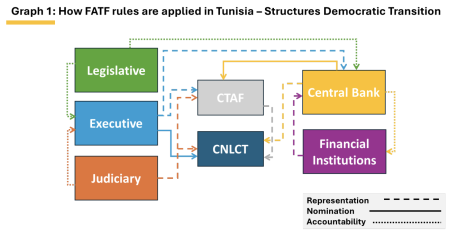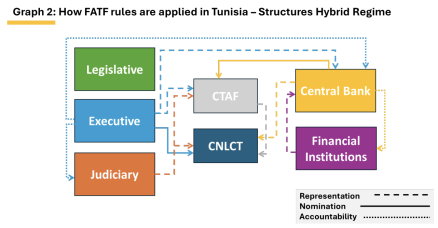New Guide Highlights Abuse of FATF Tools in Tunisia
A new guide adapting RUSI’s 2024 research to Tunisia's context, examines how FATF standards interact with shifting political institutions and what these changes mean for civil society.
During Tunisia’s democratic transition, institutional arrangements relied on the principles of representation, nomination, and accountability. Oversight by parliament, judicial independence, and the autonomy of the Central Bank (and with it, the Financial Intelligence Unit, CTAF) created a system where no actor could operate entirely unchecked (see Graph 1).
 Since the country’s turn toward a more autocratic regime in 2022, this balance has shifted dramatically. Today, the judiciary and Central Bank are directly accountable to the executive, with parliament sidelined and oversight mechanisms eroded (see Graph 2). This institutional capture undermines the independence of bodies such as the CTAF, allowing the executive to instrumentalize AML/CFT tools against political opponents and civic actors.
Since the country’s turn toward a more autocratic regime in 2022, this balance has shifted dramatically. Today, the judiciary and Central Bank are directly accountable to the executive, with parliament sidelined and oversight mechanisms eroded (see Graph 2). This institutional capture undermines the independence of bodies such as the CTAF, allowing the executive to instrumentalize AML/CFT tools against political opponents and civic actors.
 These shifts have enabled authorities to freeze assets, harass organizations, and detain individuals using AML/CFT mechanisms originally intended for financial oversight. Civil society actors, including social movements, human rights defenders, watchdog organizations, media outlets, and NPOs, have been disproportionately affected, especially those receiving foreign funding or engaging on politically sensitive issues such as migration or electoral monitoring.
These shifts have enabled authorities to freeze assets, harass organizations, and detain individuals using AML/CFT mechanisms originally intended for financial oversight. Civil society actors, including social movements, human rights defenders, watchdog organizations, media outlets, and NPOs, have been disproportionately affected, especially those receiving foreign funding or engaging on politically sensitive issues such as migration or electoral monitoring.
The Tunisian case highlights a broader dilemma: while FATF standards are presented as technical, their interpretation and enforcement are deeply politicised. Without meaningful safeguards for representation, nomination, and accountability, AML/CFT frameworks risk becoming powerful tools of repression rather than protection.
Read the guide here.




